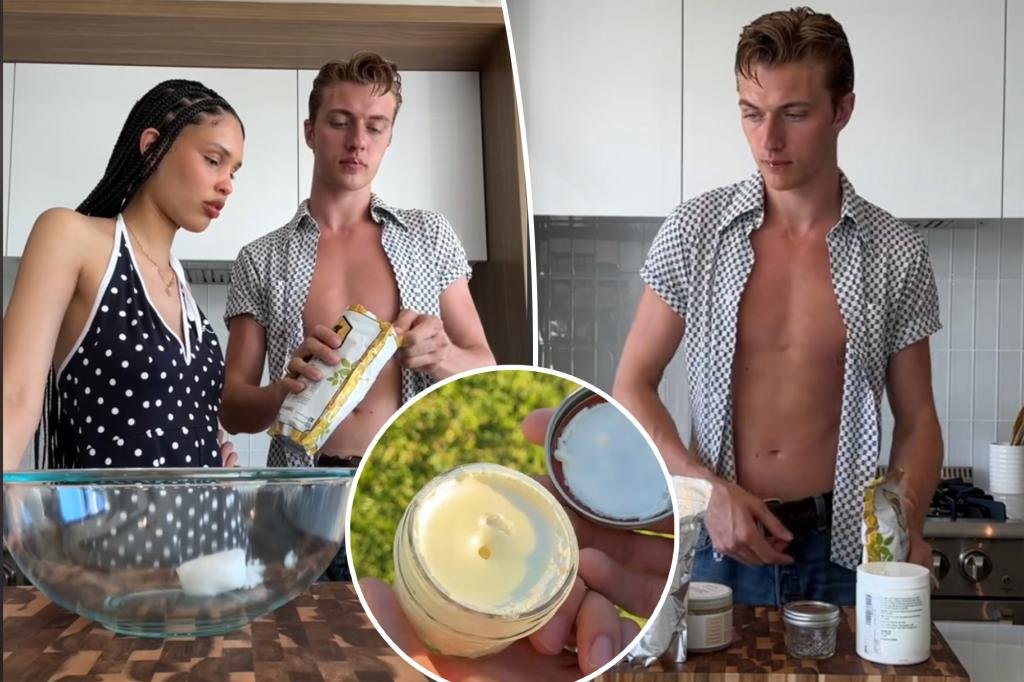Just because you can doesn’t necessarily mean you should.
Model, mother, and influencer Nara Smith, known for her DIY creations, is causing controversy with her latest homemade sunscreen — and it’s every dermatologist’s worst nightmare.
Smith, who has previously made snacks like Cheez-It crackers and Snickers bars from scratch, went viral earlier this week after posting a TikTok video explaining how she and her family had run out of sunscreen after sunbathing poolside.
So she decided to make her own, and in the video, which has since been viewed more than 16 million times, the model’s husband, Lucky Blue Smith, can be seen carefully measuring out coconut oil, beeswax, shea butter, cocoa butter, and jojoba oil and mixing them in a glass bowl, melting them into a liquid before whisking in zinc oxide powder.
“It goes on so smoothly and leaves no white residue,” Smith asserted in the calm narration characteristic of her gentle content.
Astonished viewers expressed their disappointment in her homemade sunscreen, with many calling it “crazy”, leading experts to warn curious users not to try it at home.
“DIY sunscreens should be avoided because there’s no way of knowing how effective the formula is and how much protection it will actually provide,” Dr. Maris Garshick, a board-certified dermatologist based in New York City, told Glamour.
“It can give a false sense of security and make you more susceptible to sunburn and irritation.”
New York City dermatologist Dr. Hannah Kopelman agreed, explaining to Yahoo News that homemade sunscreens are generally ineffective because they lack the “rigorous testing” that commercial sunscreens undergo.
She added that a sunscreen’s effectiveness is determined by its formula and is measured by a verified sun protection factor (such as SPF 30 or SPF 50) – a measure of how well the sunscreen blocks the sun’s harmful rays – and it’s not something you can judge from the comfort of your own kitchen.
“Homemade sunscreens don’t have this testing or regulation, so it’s impossible to guarantee consistent, adequate protection,” she said.
In fact, some of the ingredients in the Smith family’s home-cooking recipes may have the opposite effect.
“Coconut oil and jojoba oil absorb sunlight and can actually cause burns,” Dr. Mina Amin, a dermatologist with a private practice in Los Angeles, told Yahoo. “Beeswax, shea butter, and cocoa butter are supposed to be moisturizing, but they are not effective at preventing sunburn.”
And while some of the ingredients in your homemade sunscreen may actually protect your skin from UV rays, “it’s likely to be an SPF 2 or 3, not an SPF 30,” Adarsh Vija Mudgil, M.D., board-certified dermatologist and founder of Mudgil Dermatology in New York City, told Glamour.
“Please don’t!” Madgil pleaded. “Buy a reliable sunscreen that is at least SPF 30 and contains mineral ingredients like titanium dioxide and zinc oxide. The options are endless.”
Smith’s video comes amid a rise in online fear-mongering about the health effects of sunscreen, with #AntiSunscreen advocates falsely claiming that the sun doesn’t cause skin cancer, blaming Americans’ diets instead.
However, research has shown that exposure to the sun’s ultraviolet rays can damage the skin and cause skin cancer, which is why many doctors recommend using a commercial sunscreen with an SPF of 30 or higher.

